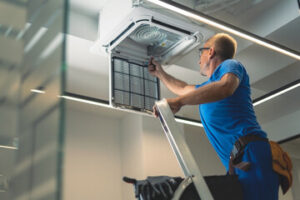If you suffer from dust allergies, have recently moved into a new home, or notice the air in your house is stale and smelly, consider cleaning your ducts. Duct cleaning involves using a high-powered vacuum and brushes to remove dirt, pollen, dander, and other debris from your air ducts. It also thoroughly cleans your air handler, registers, grilles, and other components.
 Airborne dust, mold spores, and pet dander are pulled into your home’s heating and cooling system each time the HVAC runs. These contaminants then re-circulate 5 to 7 times per day throughout your home, triggering asthma and allergy symptoms in those susceptible to them. Read on to learn more.
Airborne dust, mold spores, and pet dander are pulled into your home’s heating and cooling system each time the HVAC runs. These contaminants then re-circulate 5 to 7 times per day throughout your home, triggering asthma and allergy symptoms in those susceptible to them. Read on to learn more.
Keeping your ducts clean can prevent these allergens from circulating, creating healthy and comfortable living conditions for you and your family. If you have a child, elderly family member, or someone who has a compromised immune system, cleaning your ducts is especially important to improve their health.
Dust mites, pollen, and pet dander are some of the most common sources of home allergy. These particles can quickly settle in your ductwork and circulate throughout your home whenever the HVAC blows air through them. If you’ve recently moved into a new or renovated home, these particles may have been left behind in construction.
Stale smells are a common symptom of dirty ductwork. The accumulation of dust and debris in your air ducts acts as an incubator for harmful bacteria that contributes to bad smells and health hazards. Pets can also clog up your ductwork with their fur or dander, which can leave an unpleasant odor throughout the house. This odor is especially strong when the fur or dander clings to the dust in your duct system.
Mold and mildew can cause a musty smell in your ducts. These smells can aggravate allergies, asthma and other health issues. If you notice a musty smell in your home, it is important to call an expert for air duct cleaning. Professionals will use several EPA registered, HVAC specific solutions to clean your vents completely.
Some duct cleaning service providers may suggest using chemical biocides or ozone to kill biological contaminants inside your ductwork. While these products can help, they can also be dangerous to your health.
Air ducts are like the lungs of your home, and they need to be clean to function efficiently. If they become overloaded with dust, it can be detrimental to your health. For example, dust mites produce allergens that are a known trigger for asthma and allergy sufferers. They also can be a breeding ground for mould and bacteria.
A professional duct cleaner will use specialized equipment to remove dust and other debris from the interior of your ducts. This includes vacuuming, brushing and other techniques. In addition, they will use negative pressure to reduce the blowback of dust during the cleaning process. This helps to keep your home safe from the contaminants that could cause a fire.
Other factors that can contribute to dust accumulation are construction or remodeling dust and animal dander. The latter can be particularly problematic as it can trap harmful chemicals and germs inside the ductwork.
Mold thrives in moist environments, which is why it is especially prevalent in ducts. Air Duct Cleaning removes these spores from your HVAC system and prevents them from spreading through your entire home. It also helps to reduce the chances of other issues developing in your ducts, such as rodents, insects or vermin. When these things are in your ducts, they become the perfect breeding ground for bacteria and fungi that can cause health problems.
As a result, you may start to experience allergy symptoms like itchy eyes, coughing, sneezing, nasal blockage, skin irritation or breathing problems. Getting rid of mold will help alleviate these health problems and make your home more comfortable.
Mold spores are invisible to the naked eye, so it can be hard to know if there is mold in your air ducts. However, if you notice that your home has a musty smell when your heater or air conditioner is running, it’s a good indication that some mold might grow inside your ductwork.
